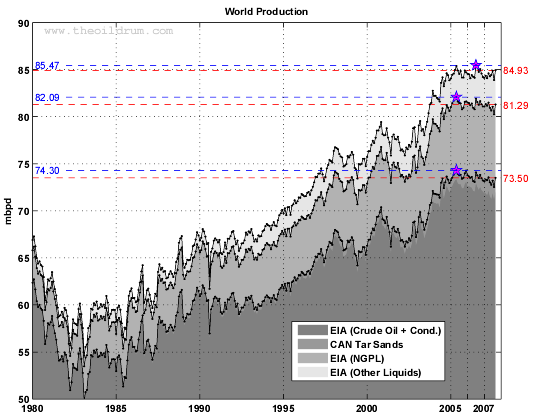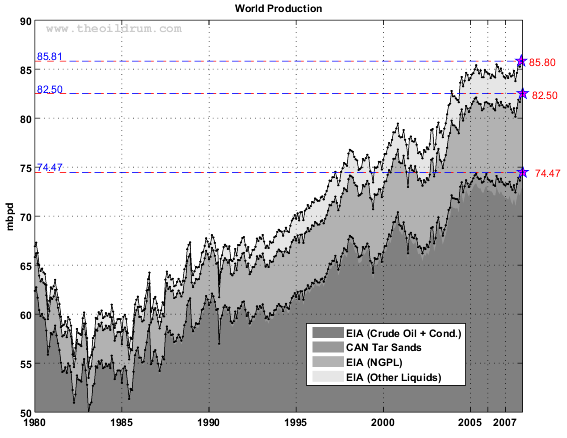At least you have the wisdom to cite Dick Cheney as an authority.Yeah. That Dick Cheney.
You are using an out of date browser. It may not display this or other websites correctly.
You should upgrade or use an alternative browser.
You should upgrade or use an alternative browser.
Oil Reserves in the U.S. Upped
- Thread starter Buffalo Roam
- Start date
In other words: from the books of oil company executives.
Sometime, sometimes it taken from satellite photos of a oil field.
Very easily. In order to increase production in a given geographical location it is necessary to drill. That should be obvious. The United States has 12,383 miles of undrilled coastline.
The deeper the drill the more expensive, also more wells don't mean more production, if a field is low pressured or is made of heavy crude it going to take a lot to get it to produce, as more expensive oil gets the more attractive alternatives get.
OK now I have a few questions. How do you explain the facts that global reserves are the highest in world history, production is at 86.9 million bpd (an all time high), and Brazil and Petrobras are growing reserves at 6% annually?
Let shooter explain:
Dick Cheney: “From the standpoint of the oil industry obviously - and I'll talk a little later on about gas - for over a hundred years we as an industry have had to deal with the pesky problem that once you find oil and pump it out of the ground you've got to turn around and find more or go out of business. Producing oil is obviously a self-depleting activity. Every year you've got to find and develop reserves equal to your output just to stand still, just to stay even. This is as true for companies as well in the broader economic sense it is for the world. A new merged company like Exxon-Mobil will have to secure over a billion and a half barrels of new oil equivalent reserves every year just to replace existing production. It's like making one hundred per cent interest; discovering another major field of some five hundred million barrels equivalent every four months or finding two Hibernias a year. For the world as a whole, oil companies are expected to keep finding and developing enough oil to offset our seventy one million plus barrel a day of oil depletion, but also to meet new demand. By some estimates there will be an average of two per cent annual growth in global oil demand over the years ahead along with conservatively a three per cent natural decline in production from existing reserves. That means by 2010 we will need on the order of an additional fifty million barrels a day. So where is the oil going to come from? Governments and the national oil companies are obviously in control of about ninety per cent of the assets. Oil remains fundamentally a government business. While many regions of the world offer greet oil opportunities, the Middle East with two thirds of the world's oil and the lowest cost, is still where the prize ultimately lies, even though companies are anxious for greeter access there, progress continues to be slow.
Dick Cheney: “From the standpoint of the oil industry obviously - and I'll talk a little later on about gas - for over a hundred years we as an industry have had to deal with the pesky problem that once you find oil and pump it out of the ground you've got to turn around and find more or go out of business. Producing oil is obviously a self-depleting activity. Every year you've got to find and develop reserves equal to your output just to stand still, just to stay even. This is as true for companies as well in the broader economic sense it is for the world. A new merged company like Exxon-Mobil will have to secure over a billion and a half barrels of new oil equivalent reserves every year just to replace existing production. It's like making one hundred per cent interest; discovering another major field of some five hundred million barrels equivalent every four months or finding two Hibernias a year. For the world as a whole, oil companies are expected to keep finding and developing enough oil to offset our seventy one million plus barrel a day of oil depletion, but also to meet new demand. By some estimates there will be an average of two per cent annual growth in global oil demand over the years ahead along with conservatively a three per cent natural decline in production from existing reserves. That means by 2010 we will need on the order of an additional fifty million barrels a day. So where is the oil going to come from? Governments and the national oil companies are obviously in control of about ninety per cent of the assets. Oil remains fundamentally a government business. While many regions of the world offer greet oil opportunities, the Middle East with two thirds of the world's oil and the lowest cost, is still where the prize ultimately lies, even though companies are anxious for greeter access there, progress continues to be slow.
I asked 3 questions and you didn't answer any of them.
I thought you said that oil executives can't be trusted but I guess you make an exception for Dick Cheney? Dick Cheney is an oil industry propagandist who at the time profited by making people believe we were running out of oil. Needless to say world oil reserves have grown dramatically since 2004.
And since you are fond of the appeal to authority fallacy, do I really need to post a list of Dick Cheney quotes that you think are obviously wrong?
1) How do you explain the fact that global oil reserves are the highest in world history?
2) How do you explain the fact that global oil production is at 86.9 million bpd (the highest in world history)?
3) How do you explain the fact that Brazil and Petrobras are growing reserves at 6% annually?
I thought you said that oil executives can't be trusted but I guess you make an exception for Dick Cheney? Dick Cheney is an oil industry propagandist who at the time profited by making people believe we were running out of oil. Needless to say world oil reserves have grown dramatically since 2004.
And since you are fond of the appeal to authority fallacy, do I really need to post a list of Dick Cheney quotes that you think are obviously wrong?
1) How do you explain the fact that global oil reserves are the highest in world history?
2) How do you explain the fact that global oil production is at 86.9 million bpd (the highest in world history)?
3) How do you explain the fact that Brazil and Petrobras are growing reserves at 6% annually?
High oil reserves are not contrary to the bell curve of production. I guess you don't understand what peak oil is at all.
What bell curve of production?High oil reserves are not contrary to the bell curve of production.
As a matter of fact, reserves have nothing to do with production at all.
I didn't think you would have the intellectual honesty or courage to answer my questions and I was right. I'll take that as a sign of your utter defeat.
Trust me I understand what peak oil is. It's a lie and a myth.I guess you don't understand what peak oil is at all.
Last edited:
The bell curve of production mirrors the actual reserves more or less, although it is more varied. My language was not precise. At the actual peak of oil production, we will appear to be producing the most oil in history. When we start to slide down the other side of the bellcurve, we will be less likely to meet demands, the price will go up disproportionally, and we will be in deep trouble. Even Dick Cheney is pragmatic in private about the realities of peak oil, although the public face is different.
What bell curve of production? What planet are you from? Global production is currently at 86.9 million bpd, the highest in world history.The bell curve of production
I don't see how that negates my premise.
I don't know what your premise is but if it's either (a) that oil production has peaked or (b) that we're running out of oil, then you're wrong on both counts.I don't see how that negates my premise.
I believe we are at or near peak. We will never run out completely, but at a certain point, production will be at the highest, and ever after will diminish, all the while demand increases, creating economic disaster because nothing can replace it.
I believe we are at or near peak. We will never run out completely, but at a certain point, production will be at the highest, and ever after will diminish, all the while demand increases, creating economic disaster because nothing can replace it.
Exactly. What is there to debate? Oil is a finite resource, so obviously its production will reach a vertex and begin to decline at some point.
Monthly production peaks are unchanged:
All Liquids: the peak is still July 2006 [2 years ago-SG] at 85.47 mbpd (revised 0.07 mbpd), the year to date average production in 2007 (9 months) is 84.32 mbpd ( 0.04 mbpd), down 0.25 mbpd from 2006 for the same period.

All Liquids: the peak is still July 2006 [2 years ago-SG] at 85.47 mbpd (revised 0.07 mbpd), the year to date average production in 2007 (9 months) is 84.32 mbpd ( 0.04 mbpd), down 0.25 mbpd from 2006 for the same period.

Sounds like religion to me. And I believe in Jesus.I believe we are at or near peak.
And you know that because peak oil theorists have been wrong every year since the 1950s?We will never run out completely, but at a certain point, production will be at the highest, and ever after will diminish, all the while demand increases, creating economic disaster because nothing can replace it.
Check the graph.
LOL. You're so openminded. You must be a great scientist.Exactly. What is there to debate?
Oil is infinite. Want to debate?Oil is a finite resource
As stated above production has nothing to do with reserves whatsoever.so obviously its production will reach a vertex and begin to decline at some point.
That graph is old. The world produced 86.9 million bpd in February 2008.Check the graph.

Last edited:
LOL. You're so openminded. You must be a great scientist.
I can tell you're open-minded, considering your custom user title ...
Oil is infinite. Want to debate?
Nothing is infinite.
As stated above production has nothing to do with reserves whatsoever.
What?
Nothing doesn't exist so how can it be infinite?Nothing is infinite.
Reserves and production are two different words signifying two different things.What?
http://dictionary.reference.com/browse/reserves
http://dictionary.reference.com/browse/production
